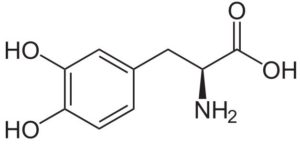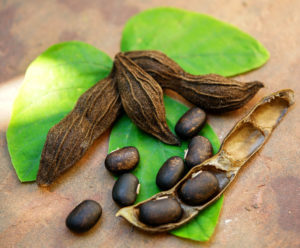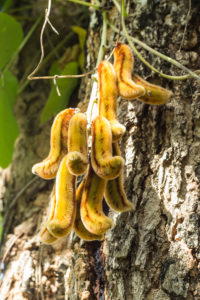Table of Contents
Key Takeaways
- L-DOPA is a vital amino acid precursor of neurotransmitters dopamine, epinephrine, and norepinephrine synthesized in the brain from l-tyrosine.
- Mucuna Pruriens is a natural source of L-DOPA, used as a nootropic to enhance brain function by increasing dopamine levels.
- L-DOPA from Mucuna Pruriens can improve memory, cognition, mood, and overall brain health while reducing stress and acting as an antidepressant.
- Opt for organic Mucuna Pruriens extract with higher L-DOPA concentrations (15% – 30%) to ensure better tolerance and efficacy, avoiding synthetic versions used for Parkinson’s treatment.
- Nootropic use of L-DOPA is generally safe and well-tolerated, but caution is necessary to avoid tolerance and dependence issues.
See my article on all of the supplements that have been shown to help with Parkinson’s here: Best Supplements for Parkinson’s Disease
L-DOPA (levodopa, L-3,4-dihydroxyphenylalanine) is an amino acid synthesized in your brain by the amino acid l-tyrosine. L-DOPA is a precursor of several neurotransmitters including dopamine, epinephrine, and norepinephrine.
Mucuna Pruriens contains naturally occurring L-DOPA in high concentrations. And is used as a nootropic because dopamine itself cannot cross the blood-brain barrier.
Dopamine and norepinephrine are essential for memory, cognition, and a positive mood. A lack of either of these neurotransmitters can lead to a lower mood state, loss of memory, brain fog, poor energy, and more. And if left unchecked will eventually result in neurodegenerative diseases like Parkinson’s.
L-DOPA helps:
- Brain Health. L-DOPA helps to increase growth hormone levels in the brain. Boosting the production of neurons and glia cells affecting the formation of memories, and overall brain health.
- Neurotransmitters. L-DOPA is a necessary precursor for your brain to make dopamine. And dopamine is then synthesized into the neurotransmitters epinephrine, and norepinephrine. Affecting cognition, learning, memory, movement, motivation and pleasure.
- Neuroprotection. L-DOPA produces neuromelanin which is similar to the melanin pigment in your skin. In your brain they absorb toxic quinones, and chelate heavy metals like mercury and lead.
Overview
L-DOPA (levodopa, L-3,4-dihydroxyphenylalanine) is an amino acid that’s naturally synthesized in your brain by the amino acid l-tyrosine.

L-DOPA is a necessary precursor to the synthesis of the neurotransmitter dopamine. Called a catecholamine, dopamine is then synthesized into the other catecholamines epinephrine (adrenaline) and norepinephrine (noradrenaline).
Unlike Dopamine, L-DOPA can cross the blood-brain barrier. This is why we supplement with L-DOPA rather than dopamine.

And for a dopamine boost, neurohackers use Mucuna Pruriens, which contains high levels of L-DOPA.[i] This legume, native to the tropical regions of India, Africa and the West Indies, and also known as velvet bean, has been used in Ayurveda medicine since 1500 B.C.
The ancients used Mucuna Pruriens to treat things like snakebite, intestinal problems, sexual issues, and a melancholy mood.
Raising levels of the neurotransmitter dopamine in your brain helps regulate mood and cognition.[ii]
Mucuna Pruriens vs. L-DOPA: What’s the Difference?
Mucuna Pruriens is an extract of the velvet bean plant that grows 3 – 18 meters in height. L-DOPA (levodopa) is usually synthetic and made in the lab.
The natural version of L-DOPA from Mucuna Pruriens is generally well-tolerated by most people. And the compounds in the plant are bio-identical to those chemicals naturally made in your body. Not so with synthetic L-DOPA.
Synthetic L-DOPA is metabolized into dopamine in your body by an enzyme called aromatic L-amino acid decarboxylase (AADC). And the majority of synthetic L-DOPA will be converted peripherally (not in the central nervous system and brain). This can cause problems.
So when used therapeutically, as in treating Parkinson’s Disease, L-DOPA is administered in combination with an inhibitor of peripheral AADC. Drugs like carbidopa (or other AADC inhibitors) ensure most of the L-DOPA is preserved for conversion to dopamine in the brain. And not the rest of your body.
This is critical for nootropic users to keep in mind. Chronic, or prolonged use of synthetic L-DOPA can lead to things like dyskinesia. This is a movement disorder where neurological discoordination results in uncontrollable, involuntary movements.[iii]
I am not telling you this to dissuade you from using L-DOPA. Stick with an extract of Mucuna Pruriens and you should be fine.
How does L-DOPA Work in the Brain?
L-DOPA boosts brain health and function in several ways. But two in particular stand out.
- L-DOPA improves memory. It’s metabolized into dopamine in your body by an enzyme called aromatic L-amino acid decarboxylase (AADC). This increases dopamine levels in your brain.
Researchers at the University of Münster in Germany conducted a study with 40 healthy people. In this randomized double-blind study, they gave one group 100 mg of levodopa daily for 5 days. The other group took a placebo.
90 minutes later on each day, subjects were given a memory test based on vocabulary. The study found that levodopa significantly enhanced the speed, overall success, and long-term retention of novel words.[iv]
- L-DOPA promotes brain health. Research suggests Mucuna Pruriens protects your brain by regulating cognitive and neural functions. And even encouraging neural activity.
Researchers in India showed that Mucuna Pruriens is a potent antioxidant. They performed assays to evaluate the enzymatic and nonenzymatic antioxidants in extracts. They found high levels of flavonoids, alkaloids, tannic acids, gallic acids, quercetin equivalents, and sitosterol equivalents.[v]
All of these compounds scavenge for free radical in your brain. Free radicals are formed during normal brain activity, like the synthesis of ATP that is produced in your mitochondria.
Your brain is equipped to eliminate some of these free radicals on its own. But especially in today’s environment in which we live, your brain is overwhelmed. Free radicals cause inflammation which damages and can kill brain cells. Affecting memory, learning, recall, cognition and mood.
Mucuna Pruriens has been proven to be a very effective brain inflammation fighter. It even has the ability to chelate heavy metals like mercury and lead in brain cells. And it’s antibacterial.[vi]
Mucuna Pruriens helps your brain make naturally occurring neuronal pigments called neuromelanin’s. They’re similar to the melanin found in your skin. And they’re often found in regions of your brain where dopamine is active.
The synthesis of neuromelanin’s in the various regions of your brain is an important protective process. The melanic component is generated through the removal of reactive/toxic quinones that would otherwise cause neurotoxicity.
This melanic component promoted by Mucuna Pruriens is what chelates and accumulates toxic, heavy metals like mercury and lead.[vii] Preventing them from damaging brain cells.
How things go bad
As we get older, our brain chemistry and energy metabolism changes.
↓ Dopaminergic neurons are damaged or die
↓ Dopamine levels decline
↑ Stress levels increase
↓ Long-term memory and mood decline
All of these age-related changes are contributing factors to the neurodegenerative diseases of aging, including Parkinson’s Disease.
L-DOPA benefits for brain health
Mucuna Pruriens natural herbal supplement extract contains high levels of L-DOPA, the precursor to the crucial neurotransmitter dopamine. Dopamine is further synthesized into the neurotransmitters epinephrine (adrenaline) and norepinephrine (noradrenaline).
Dopamine plays a critical role in learning and absorbing new information. Increasing brain levels of dopamine helps regulate mood and boosts cognition.
Research also suggests that Mucuna Pruriens provides antioxidants that defend against oxidative damage caused by free radicals.[viii]
How does L-DOPA feel?
Neurohackers report that using Mucuna Pruriens helps in multi-tasking, improving motivation, more focus, less stress, and a sense of calm.
You could find your energy levels increase, less brain fog, and a boost in overall mood. A more positive outlook on life. And an increase in libido.
L-DOPA Clinical Research
Mucuna Pruriens (L-DOPA) as an
alternative for Parkinson’s Disease
Researchers at the Parkinson’s Institute located at the University of Milan in Italy recruited 18 patients with advanced Parkinson’s Disease. The patients were given either ground Mucuna Pruriens powder (standardized 5.7% L-DOPA) or prescription form of levodopa containing a dopa-decarboxylase inhibitor. And then measured motor improvements at 60 and 90 minutes after using the supplement or drug.
The researchers found Mucuna Pruriens standardized powder produced reduced Parkinson’s symptoms equivalent to the prescription version of levodopa. But with significantly fewer problems with dyskinesias. The team concluded the “Clinical effects of high-dose Mucuna Pruriens were similar to levodopa alone at the same dose, with a more favorable tolerability profile“.
Mucuna Pruriens reduces stress
A study was conducted to assess the role of Mucuna Pruriens in infertile men. It was done at King George’s Medical University in Lucknow, India. The study included 60 men who were undergoing infertility screening. And no surprise here; were found to be suffering from stress.
The control group in this study were 60 age-matched men who had initiated at least one pregnancy. The infertile men were given 5 grams of Mucuna Pruriens seed powder per day for 3 months. Semen samples were collected at the beginning of the study. And after 3 months of treatment.
The researchers found that treatment with Mucuna Pruriens significantly decreased stress levels. And increased sperm count to the same level as the fertile control group of men.
They “concluded that M. pruriens not only reactivates the anti-oxidant defense system of infertile men but it also helps in the management of stress and improves semen quality.”[ix]
L-DOPA improves learning
This study in Germany was done with 40 healthy subjects. They were given 100 mg of L-DOPA or a placebo for 5 days in a randomized, double-blind trial.
Subjects were trained on artificial vocabulary using a high-frequency, repetitive approach. This was done 90 minutes after L-DOPA administration on each day of the trial.
The researchers found that L-DOPA significantly enhanced the speed, overall success, and long-term retention of the words.[x]
L-DOPA as an anti-depressant
Increasing dopamine in your brain also boosts your mood and libido. This study was done in India with mice. Researchers used the well-known Forced Swimming Test (FST), Tail Suspension Test (TST), and Chronic Unpredictable Mild Stress (CUMS) test.
The mice were fed Mucuna Pruriens seed extract, and then evaluated while performing, well… what mice do in the lab. The research team found that Mucuna Pruriens seed extract has significant antidepressant qualities. Which would simply verify what we already know in humans.[xi]
Using Mucuna Pruriens extract is a great anti-depressant.
L-DOPA Recommended Dosage
L-DOPA (Mucuna Pruriens extract) suggested dosage for cognitive benefits is 250 – 500 mg twice per day. Most Mucuna Pruriens extracts only contain 15 – 20% L-DOPA. So you may need to adjust your dose up or down depending on how you respond to this supplement.
You may also find that you need to cycle the use of L-DOPA (Mucuna Pruriens). And use it only 4 or 5 days a week. This can help avoid tolerances and dependencies (which are common with any dopamine agonist). DO NOT attempt to cycle this nootropic if you are using it to treat Parkinson’s Disease.
If you are using Mucuna Pruriens extract (L-DOPA) for Parkinson’s Disease you will likely need 500 – 1,000 mg Mucuna Pruriens 3 or more times per day. And look for a Mucuna Pruriens extract (98% L-DOPA).
See my article on all of the supplements that have been shown to help with Parkinson’s here: Best Supplements for Parkinson’s Disease
L-DOPA Side Effects
L-DOPA is produced naturally in your body. So is considered well-tolerated and safe. And L-DOPA from Mucuna Pruriens extract is particularly well tolerated by most people.
Research shows that the natural form of L-DOPA from Mucuna Pruriens compared to synthetic versions of L-DOPA provides similar results. But without the common side effects of nausea, vomiting, and involuntary muscle movement.[xii]
But be very careful when working with dopamine. Too much and you can experience symptoms like hair loss, auditory or visual hallucinations, psychosis, Dyskinesia and more.
Of course, if you begin to experience any of these side effects, stop supplementing with L-DOPA (Mucuna Pruriens) immediately.
Like any natural supplement, it’s always better to use an organic source.

Type of Mucuna Pruriens (L-DOPA) to buy
Mucuna Pruriens is typically available in powder, capsule or tablet form. Some are pure, dried Mucuna Pruriens powder.
Several manufacturers offer Mucuna Pruriens extracts ranging from 15% – 30% L-DOPA. Or they tell you how many mg of L-DOPA is in each capsule or tablet.
A few manufacturers call it “Velvet Bean Extract” or “Mucuna Extract” with the percentage of L-DOPA in each capsule or tablet. It’s the same as Mucuna Pruriens.
Try to find “organic” or “certified organic” if you can. And for Nootropic use, avoid synthetic L-DOPA which is typically used to treat Parkinson’s Disease.
Nootropics Expert Recommendation
L-DOPA (Mucuna Pruriens) dosage 250 – 500 mg twice per day
 I recommend using L-DOPA as a nootropic supplement.
I recommend using L-DOPA as a nootropic supplement.
Your body does synthesize some L-DOPA on its own. And converts it into the essential neurotransmitters dopamine, epinephrine, and norepinephrine.
But as you get older, dopamine receptors die or become unresponsive. Or your body doesn’t convert the necessary amino acids well enough to supply the neurotransmitters you need for an optimized brain.
L-DOPA is helpful to boost energy and motivation levels, memory, clear brain fog, improve mood and libido.
L-DOPA is especially helpful for those suffering from neurodegenerative diseases like Parkinson’s. And the natural form of L-DOPA from Mucuna Pruriens often offers better results with fewer side effects than prescription drugs.
I suggest starting with a dose of 100 – 250 mg twice daily for nootropic use at first. And you may find that you need to cycle L-DOPA. Use it for 4 or 5 days and take a break. Tolerance is often a problem when working with dopamine. As is dependence or addiction.
If you are using Mucuna Pruriens (L-DOPA) for Parkinson’s Disease, please see my article on all of the supplements that have been shown to help with Parkinson’s here: Best Supplements for Parkinson’s Disease









Join The Discussion - 380 comments
Anthony
October 5, 2020
Hi David,
I have been weaning off Cymbalta from 30mg and now at 7mg and it’s been hell. Cymbalta is a nightmare of a anitdepressant to come off of and i wonder why, maybe you know? It’s a snri and i wonder if it’s not a lack of nor adrenaline issue and not serotonin like ssri withdrawals, do you know?
I am thinking of taking Mucuna Pruriens 98% exstract with my 7mg of Cymbalta.
1.Would that be safe? 2. would that help if i take like 100mg Mucuna Pruriens 98% exstract for withdrawals.
3.Could i add 50mg 5htp with that, would that be safe? Read about you saying that we must balance serotonin levels and dopamine levels or there would be a problem. why i was thinking of adding it.
I know your not a doctor but do you know of anything that might help with the Cymbalta withdrawals??
I hate antidepressants and want to rather use nootropics. They seem to work better, faster and less side effects and def no discontinuation syndrome.
Thanks
David Tomen
October 6, 2020
Anthony, it’s what the drug companies and doctors don’t tell you. About how insidious these drugs are. It’s not just neurotransmitters like serotonin and norepinephrine that are affected. Among other problems they change gene expression. Which is nearly impossible to reverse. And why they’re such a bitch to get off of.
I do not recommend anything that boosts dopamine or serotonin while this drug is in your system. Here is one example why: https://www.drugs.com/drug-interactions/cymbalta-with-tryptophan-949-2273-2568-0.html. That Drug Interaction Checker also has “dopamine” listed as contraindicated which excludes using L-Tyrosine and Mucuna Pruriens.
Anthony
October 7, 2020
Thanks so much David.
I am glad i am coming off all these but hope it’s not to late. 🙂
David
September 10, 2020
David, thank you for the great information! I just started taking the Naturebell (30%) c/Ashwagandha. I wanted to confirm that I would need to take three 500mg capsules to reach an effective dose for for libido effects. I’ve recently had some ed/delayed ejaculation issues and came across Mucuna as a potential help.
Humorous side note… nootropic sexpert.com 🙂
David Tomen
September 10, 2020
David, it was unintentional. But when you think about it even a little it’s your “Head First” before you can sort everything else out.
David
September 10, 2020
True! Could you confirm dosage? Thanks!
David Tomen
September 11, 2020
David, for Mucuna it depends on the strength of the extract. For a 30% extract try 250 mg twice per day and see if that works.
Harsh
August 5, 2020
Hi David
Thank you for helping out here.
I m currently having PAWS after I left alcohol. I feel really low energy and motivation. I m not sure if this is due to low dopamine levels or low dopamine receptors quantity and/or sensitivity.
Using Mucuna, how can we verify it?
David Tomen
August 6, 2020
Harsh, it either low dopamine or damage to the dopamine pathway. The safest way to increase dopamine is with L-Tyrosine. And do something to repair things as well like trying N-Acetyl L-Cysteine (NAC).
Nikki
July 28, 2020
Hi ! I need about 1,000 mg to 1400 mg of 40 % dopa MP, for PD daily. Unfortunately I’m experiencing hair loss. Is there anything I can take to
counteract the MP causing hair loss ?
David Tomen
July 28, 2020
Nikki, that’s a loaded question and different natural remedies have been promoted and tried over the years. Likely one of the most effective is Rosemary essential oil (https://amzn.to/2DalUxQ) which can be used on your scalp if it’s diluted with Castor Oil (https://amzn.to/2Dj8KOX) and some fractionated coconut oil. And find a Rosemary shampoo (https://amzn.to/39BCFOL) as well. It should help.
Anonymous
July 1, 2020
Hello David!
Just like there are SSRIs, which increase Serotonin in the system by blocking it’s reuptake, is there any SDRI for increasing Dopamine by blocking it’s reuptake?
SSRIs were shown to cause more Depression than it cures, and there were recorded astronomical number of suicides after using Prozac. So, will Selective Dopamine Reuptake Inhibitors do the opposite?
David Tomen
July 1, 2020
Not SDRIs but SNRIs which are serotonin norepinephrine reuptake inhibitors. But I’m a “nootropics expert” and not a drug expert so need to defer to those who know more about these drugs than I do.
One thing I do know is an SNRI is not the “opposite” of a SSRI. It just works differently in your brain.
I’ve found that Wikipedia is a fairly good resource for researching this kind of material. Do a search on their site for “serotonin norepinephrine reuptake inhibitor” and for “SNRI” and see what turns up. Then check the “Pharmacology” of each as well as whatever side effects are mentioned.
One more thing … If you’re using Prozac and getting some benefit from it then search Nootropics Expert (search function top right) and search for the keyword “Prozac” as well as its generic name. You’ll come across at least a couple of natural nootropics that have proven to be as effective as the drug in clinical trials.
Doug V
August 5, 2020
David, if the poster from July 1, 2020 5:49 am is looking for a dopaminergic equivalent of an SSRI, I would mention pramipexole. Although it’s not a dopamine reuptake inhibitor, the effect it produces is more similar to what SSRIs do for serotonin, as opposed to the DRIs like methylphenidate and modafinil which truly do slow down reuptake but are short-lived. Pramipexole has helped many suffering from the form of treatment-resistant depression that is based on abnormal dopaminergic function rather than the more standard serotonergic dysfunction.
Dave
June 24, 2020
Hi Dave,
I have used L tyrosine for about 1 week and the results seems to be very good as my anxiety levels drop. Howevery, I am hyperthyroid a bit and I cant take it.
I am in searching for a dopamine supplement and l dopa seems to be fine, but I am worried about the too much dopamine side effects as I am using L theanine, kava, inositol and passionflower. Only Inositol is the regular one.
Is it safe enough to use it with these supplements? And are there are safer dopamine supplements?
David Tomen
June 25, 2020
Dave, the only “dopamine” supplements are its direct precursors. And those are L-Tyrosine which is 2-steps away from dopamine synthesis. And L-DOPA which is 1-step away.
Any other supplement that affects dopamine typically affects its receptors or transporters. Which influences how dopamine works.
Not sure what you mean by inositol being “the regular one”. All the supplements you mentioned are safe for most people when used at recommended dosages.
One other thing – L-Tyrosine is used to make thyroid hormone along with iodine, selenium, magnesium and Vitamin C. I would think that using L-Tyrosine would make you even more hyper. But I’m not sure that L-DOPA would have the same effect on your system.
You also need to keep dopamine and serotonin in balance. If you raise dopamine too much you suppress serotonin. And vice versa. But you can keep serotonin levels up by using L-Tryptophan. Maybe that would help?
Svetoslav Lazarov
June 26, 2020
Hi Dave,
I will take L-Tryptophan for sure, if decide to add L-Dopa to the stack as last year I’ve took 5-HTP (25-50 mg, not regularly) without any dopamine supplement and I am a bit worried about chemical disbalance.
Regarding the Inositol, I am taking it everyday about 1-2g per day.
Another supplements are in the experimental state, as I am not aware about possible interactions about Kava kava, L-Theanine and Inositol. Currently trying Hawthorn (with little magnesium oxide and B6 added in the supplement), as Passionflower doesn’t seems to work well for my anxiety.
I am taking those at recommended dosage only.
The questions here is are there any interactions between Inositol, Kava, L-Theanine and Hawthorn? I didn’t find any when searched in internet and in your site.
Dave
June 26, 2020
By the way a different name is used in the above comment. Don’t to be confused with it, as google just pre populate the name by itself, not sure how.
David Tomen
June 27, 2020
I’m not aware of any contraindications with what you’re using.
Deborah
June 22, 2020
Hi David. If the Mucuna capsule is 500 mg with 10 – 15% l dopa then would I need 5 – 10 capsules to reach 250-500 mg recommended for Parkinson’s? I want to try Mucuna before trying Sinemet. Should I take twice a day empty stomach? Also please should I take it together with 5 HTP? Or L Tryptophan? Or L Tyrosine? Or all of the above? Also should I cycle 5 days on and 2 days off? Or every other day? Thanks so much! Deborah
David Tomen
June 23, 2020
Deborah, it’s best if you find a Mucuna Pruriens extract with a higher percentage of L-DOPA per dose. They’re hard to find but it’s possible with some diligent searching.
The dopamine synthesis pathway goes like this: L-Tyrosine > L-DOPA > dopamine. So L-DOPA is just one step away from making dopamine. L-Tyrosine is 2 steps away. So you could use both to support dopamine which is what I do for Adult ADD.
But you’ll need to experiment to see what dosage is best for you. Keep in mind that you need a good B-Complex as well for this to work because the B-Vitamins are required for the synthesis of dopamine.
And you’re correct that as you raise dopamine you need to support serotonin to keep them in balance. If you get the dosage right then you don’t need to bother taking 2 days off. The safest way to raise serotonin is with L-Tryptophan. Use it before bed because it can help you sleep too.
The key to making this work is experimenting with dosages of each supplement. Your brain may need more or even less than someone else dealing with the same issues. So don’t get discouraged if you find it takes some time to get this right. Stick with it and keep going until you’ve got your unique requirements figured out.
Deborah
June 27, 2020
Thank you so very much. I do plan to contact you for a consult as this is so very important. I would like to heal my PD symptoms naturally without Sinemet
Anonymous
June 21, 2020
Hello David!
If I take Mucuna extract 500mg with 15% L-Dopa then after sometime will it stop body’s own production of Dopamine and will it cause Serotonin syndrome and low libido if it’s discontinued?
David Tomen
June 21, 2020
Anonymous, no it will not if you use it at recommended dosages. Your body will get rid of what it cannot use. But naturally, if you raise dopamine long-term without also addressing serotonin they’ll go off-balance. Which causes its own problems.
Serotonin Syndrome can happen with excess serotonin and that’s usually when using nootropics that directly increase serotonin while using a SSRI or SNRI.
Raising dopamine should also help with libido. If you discontinue whatever you were using to boost dopamine libido will drop back to what it was before you started.